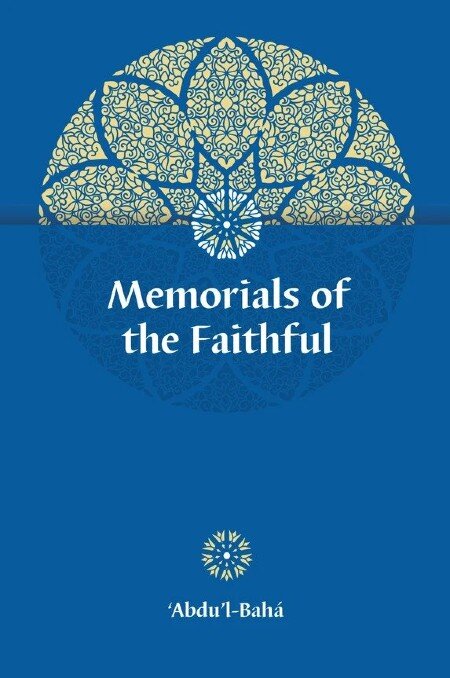Highlighting Australia
- As a proudly Australian initiative, we’re excited to showcase a collection of Australian stories, music, tributes and more.

Join activities, celebrations, study groups, spiritual empowerment and education programs for young people, and more.
Baha’i beliefs address essential spiritual themes for humanity’s collective and individual advancement. Learn more about these and more.

Featured in: Study Circles & Study Materials
A study circle is a small group that meets to study the course materials from the Ruhi Institute. This collection contains resources related to study circles, as well as resources to assist anyone with deepening their understanding of the Baha’i Writings.

During the centennial commemorations of the Ascension of Abdu’l-Baha, let us remember a precious gift from Him.
That gift is Memorials of the Faithful, a volume the Master wrote in 1915.
Shoghi Effendi published it in 1924, the first book to emerge after he began his ministry.
We can understand why the Guardian made this book his priority when we start to view it as far more than a collection of seventy obituaries of Baha’is who passed away during the lifetime of the Master.
Rather, it is really a collection of parables, true stories that contain within them the lessons we can take from the example of people who were energised by the spiritual power of Baha’u’llah.
In her remarkable introduction, the book’s translator into English, Marzieh Gail points out that Memorials of the Faithful, is “a book of prototypes, a kind of testament of values endorsed and willed to us by the Baha’i Exemplar.”
The Exemplar, Abdu’l-Baha, is giving us examples of attributes that emerge as facets of one spiritual coronet: radiant joy, detachment, kindliness, eloquence, and learning.
To experiment, we can start by reading the first few accounts, remembering that the stories in this volume were not written and edited later but were noted down by a secretary as they flowed from the tongue of the most eloquent of teachers.
Marzieh Gail concludes: “These are short and simple accounts, but they constitute a manual of how to live, and how to die.”
In the first of the tributes in the book, Abdu’l-Baha describes Nabil-i-Akbar1 as excelling in theology, the humanities, the teachings of mystics. In spite of his sufferings, “he was never dispirited, rather his joy and ardour increased with every passing day.”
Nabil shared the teachings of the Baha’i Faith, the Master says, with examples drawn from the background of his inquirers, guiding people by their own philosophical principles.
“He passed by the world and its rewards: he closed his eyes to rank and wealth….Of wide learning, he was at once a mujtahid,2 a philosopher, a mystic, and gifted with intuitive sight, he was also an accomplished man of letters and an orator without a peer. He had a great and universal mind.”
Then we move on to a description of Ismu’llahu’l-Asdaq, one of the Hands of the Cause of God who attained the presence of Baha’u’llah. The name Ismu’llah means “the name of God.”
Abdu’l-Baha: “He always taught cheerfully and with gaiety, and would respond gently and with good humour, no matter how much passionate anger might be turned against him by the one with whom he spoke.”
The sufferings of Ismu’llah at the hands of persecutors were, He said, “agonising trials.” Abdu’l-Baha describes them in horrific detail but with a stunning conclusion.
“Ismu’llah did not slacken under fire. Once freed, he taught more widely than ever…his tongue was eloquent, his strength and steadfastness astounding. When he opened his lips to teach, the proofs would stream out, when he chanted or prayed his eyes shed tears like a spring cloud.” He truly was, the Master says, “the Name of God.”
Abdu’l-Baha’s affection for these heroes is touching. Of another Hand of the Cause, Mulla Ali-Akbar, He says: “I loved him very much, for he was delightful to converse with, and as a companion, second to none.”
Then comes His tribute to “the great Afnan”, who lived in the very room that is now the Shrine of Baha’u’llah. Mirza Hasan, Abdu’l-Baha says, was “thoroughly versed….in mathematics, geometry and geography, in brief he was well grounded in many fields, thoroughly conversant with the thought of ancient and modern times.” An astronomer, Mirza Hasan would make observations of the stars every night, possibly inviting Abdu’l-Baha—and perhaps even Baha’u’llah—to use his telescope to gaze upward to the physical heavens.
Abdu’l-Baha: “He was truly erudite, a great credit to the Cause of God amongst leading men of learning. With a few concise phrases, he could solve perplexing questions.” So says One who had these qualities to the ultimate degree.
Marzieh Gail points out that the imperfect eye beholds imperfections, unlike the vision of Abdu’l-Baha who focused on the excellent qualities of those he was describing. This is yet another example from this book of how we should view our contemporaries.
The two longest tributes in the book are to women. One is to Shams-i-Duha, the mother-in-law of the King of Martyrs, and the other is to the Tahirih, the famed Letter of the Living.
Everything Abdu’l-Baha did can be taken as an example. The length of these tributes is not only reflective of the greatness of these two, but also helps to counter the historical and cultural circumstances that often renders women absent in other collections of stories of heroes.
In His tribute to Tahirih, the Master describes the wondrous address this famed poet delivered to Vahid, that concludes with the memorable injunction: “Let deeds, not words, be our adorning.”
Abdu’l-Baha says: “I was then a child, and was sitting on her lap.” Thus He emphasises His sweet connection with the woman who will forever epitomise the principle and reality of gender equality.
There are many reassuring statements about the afterlife in Memorials of the Faithful. Light plays a part in the prayer for Nabil-Akbar: “May God welcome him in the Paradise of reunion, and shelter him forever in the realm of the righteous, submerged in an ocean of lights.” In the conclusion to the obituary for the Great Afnan, Abdu’l-Baha says that “His soul gave up this life and fled to the eternal one; passed into the Heaven of abiding reunion and was immersed beneath an ocean of light.”
Abdu’l-Baha’s attitudes towards death may point to what Baha’u’llah said: “In the treasuries of the knowledge of God there lieth concealed a knowledge which, when applied, will largely, though not wholly, eliminate fear.”3
It remains for each of us to go on our own great adventure mining for the priceless jewels embedded in every biography in this book, a publication which Marzieh Gail says is a token of the Master’s love for the human race.
Half a century ago, she concluded her introduction to the volume by noting that the love Abdul-Baha Himself personified was “not blind but observant, not impersonal but warm and tender, it was a continual attitude of unobtrusive care.”
“Such love, from such a Being, does not end with one life-span…His love is here, for new millions to find.”
You can read Memorials of the Faithful here in its entirety on the Baha’i Reference Library: www.bahai.org/library/authoritative-texts/abdul-baha/memorials-faithful
You can also purchase a copy from Bahaibooks.com.au in Australia.
"*" indicates required fields

We recognise their continuing connection to land, waters and community. We pay our respects to Aboriginal and Torres Strait Islander people and their cultures; and to elders both past and present.
The views expressed in our content reflect individual perspectives and do not represent authoritative views of the Baha’i Faith.

Visit the site of the
Australian Baha’i Community
and the Baha’i Faith Worldwide
Notifications
“Journey to a Mountain”, “Coronation on Carmel” and “Sacred Stairway”, are masterpieces by Michael. I believe any Bahai pilgrims should read them before they go for their pilgrimage to the Holy Land. The beautiful and informative insights in these books will enrich their pilgrimage experience abundantly.
Nasser Kaviani (November 11, 2021 at 11:15 PM)
So beautifully written. Really a precious gift from The Master. Thank you Michael Day and Baha’i Blog for this Post.
Criselda F Cartagena (November 11, 2021 at 12:05 AM)
I am pleased that you enjoyed this post, Criselda. Thank you for your kind words.
Michael V Day (November 11, 2021 at 1:05 AM)
Thank you. Nasser, for your kind words about my books. I hope that pilgrims find that they assist them to appreciate even more the Shrine of the Bab and its exquisite precincts.
Michael V Day (November 11, 2021 at 1:10 AM)